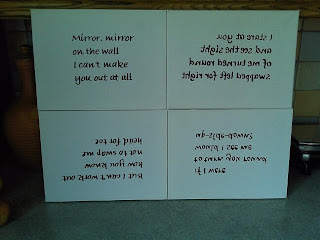I'm still digesting all the information from Chris Jones's amazing film making masterclass. When I
wrote about it a few days ago, I promised to write more regarding lessons that novelists could take from the class.
One of the things in Chris's course that struck me most forcefully was a test he used in deciding whether/how to proceed with a film making project based on the title, strapline and poster image.
Does the title alone tell the potential audience what sort of story to expect? Or does it mislead? Does it imply a story or not? What about the strapline - does that help? And the same question goes for the poster image. Unless you have a HUGE advertising budget, your potential audience will make their decision to part with money or not based on this information alone: title, strapline and poster image.
How about these for movie titles that imply a story:
Home Alone
Snakes on a Plane
Star Wars
And for a perfect strapline:
Alien - in space no one can hear you scream
And a poster that tells the audience all they need to know about the kind of film to expect:

Chris described how he had designed three posters for one film project but couldn't get any of them quite right. Thus the film remains unmade. The poster test was revealing a flaw that would have come back to bite him at the point of trying to sell the movie - an ambiguity in genre and audience.
Perhaps novelists think they are above such base commercialism. But it seems to me that we have a lot to learn from filmakers. Even if money doesn't matter to you as a writer, surely having readers matters hugely. And in this game, one equates to the other.
So how about it? Before getting stuck into a long writing project, choose a title, a strapline and a cover image. Who is going to buy that book? Where will it be sold? And if you are really happy with your answers to those questions - why not write the back-blurb? Fifty words of hard sell. Do a mock-up of the book cover. Ask twenty friends what they think of it. Better still, ask twenty strangers.
Even if we don't like to think of our work in these terms, be sure that editors and agents have to.





 Chris described how he had designed three posters for one film project but couldn't get any of them quite right. Thus the film remains unmade. The poster test was revealing a flaw that would have come back to bite him at the point of trying to sell the movie - an ambiguity in genre and audience.
Chris described how he had designed three posters for one film project but couldn't get any of them quite right. Thus the film remains unmade. The poster test was revealing a flaw that would have come back to bite him at the point of trying to sell the movie - an ambiguity in genre and audience.




 Curiously, the building also contains living accommodation and office space for rent. I have yet to figure out whether this was for economic reasons, or perhaps in response to some planning requirement. Time will tell how this aspect of the place works out.
Curiously, the building also contains living accommodation and office space for rent. I have yet to figure out whether this was for economic reasons, or perhaps in response to some planning requirement. Time will tell how this aspect of the place works out.